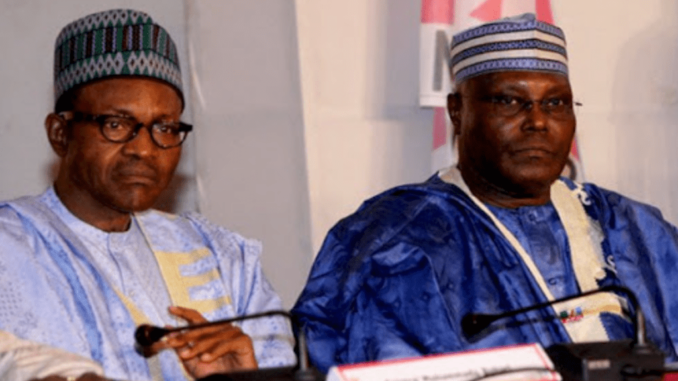
It matters, therefore, that invited to adjudge the suitability of different individuals for the office of president of the Federal Republic of Nigeria, we should place great store on their respective understanding of the problems faced by the country. And the solutions on offer.
Irrespective, today, of the content and temper of the conversations around the relative competences of successive Nigerian governments, the Goodluck Jonathan administration marked an extreme low for governance in the annals of this country. Until recently, one could argue that given the depths plumbed by the administration, it had only the Shehu Shagari government as rival in its ineptitude. It is for this reason that any government after Dr. Goodluck Jonathan didn’t have to do much to score highly on the government effectiveness scale. After all, progress from “zero” to “one” is equal to a hundred per cent increase. Not to talk of how much progress there is from turning negative growth positive.
The Buhari government and its boosters have played the latter part of this narrative for all it is worth. Yet, in truth, the sense of the taciturn ex-general’s supposedly immense achievements, thus far, owes much to the fact of his predecessor’s abysmal non-performance. Beyond this, though, even the tale around the incumbent administration’s success weakens against two complimentary backdrops. First, we cannot continue to pretend that we are not aware that countries no worse off than ours have shown and continue to demonstrate that there are increasingly no limits to what’s possible when it comes to growth, development and the task of reducing the number of people in poverty.
Much of the current conversation on the prospects for the continent’s growth and development (and of denting the number of its indigent citizens) is focussed on the respective outcomes in Rwanda and Ethiopia. It does not help that both of these economies don’t pretend to be democratic. (Which is crucial. For, in the end, stripped of much of the fancy talk through which it is presented, the unstated part of much of the support for Muhammad Buhari, as president, is the belief that as a form of government, democracy is too weak to solve Nigeria’s myriad problems. The benign caudillo, this sotto voce argument goes, is best positioned to contain the forces arrayed against the country’s progress, while corralling progressives in the right direction).
…consensus is that whether in terms of the global context within which Nigeria’s growth and development must take place or considered from the vantage of the (largely negative) pressures building up within the system, President Buhari didn’t pass muster. He stumbled. He stuttered. And in many instances, his responses were pathetic.
Nor can we ignore the fact that the progress made in both countries is from a miserly position. In Rwanda’s case, recovering from a horrendous civil war. And in Ethiopia, trying to come back from the darkness in which some of the most backward socialist thinking on the continent had plunged the country. Still, in both countries, the basic ingredients of progress appear clear. First, free the economy’s “animal spirits”. Then, rather than reinvent every known wheel in the name of some new authenticity, use the considerable advances notched up by science and technology to leap-frog the advances made by leading economies.
If these two examples erode the optimism around the gains purportedly made by the incumbent government, we’re not allowed to dwell too long on the limited success reportedly achieved, thus far. The growing impoverishment of the larger number of our compatriots is a hard floor (relentlessly rising, and thus likely soon to constrain the space for action) that makes it difficult to ignore the problem of our pathetic growth rates, without imperilling the long-term outlook for our commonwealth.
If, therefore, we must discuss President Buhari’s performance at the recent town hall meeting, it must be against how he measures up to both of these trends. Unfortunately, consensus is that whether in terms of the global context within which Nigeria’s growth and development must take place or considered from the vantage of the (largely negative) pressures building up within the system, President Buhari didn’t pass muster. He stumbled. He stuttered. And in many instances, his responses were pathetic.
Sadder, then, that the leading candidates for this office lacked the courage of their convictions and turned tail at the presidential debate!
A correspondent, responding to the latter observation, reminded me of how eventually ineffective at work have been many fluent Power Point presenters. In this reading, President Buhari is a silent achiever. Taciturn, not dimwitted. Discreet, not simple. Above all, it is argued, his heart is in the right place — beating, unlike any of those currently competing to unseat him at this year’s general election, in synchrony with our people’s key pain points.
King Duncan, it was, who said in the opening acts of Shakespeare’s Macbeth that “There’s no art to find the mind’s construction in the face”. We are, nearly always, invited to do this by proxying for both what a person says, and what he does. So, is it true, in this regard, that “actions speak louder than words”? When platitudes are bandied abroad the way they tend to be in this country, masquerading as deep insights into the economy’s woes, context is that much more important. It matters, therefore, that invited to adjudge the suitability of different individuals for the office of president of the Federal Republic of Nigeria, we should place great store on their respective understanding of the problems faced by the country. And the solutions on offer.
Sadder, then, that the leading candidates for this office lacked the courage of their convictions and turned tail at the presidential debate!
Uddin Ifeanyi, journalist manqué and retired civil servant, can be reached @IfeanyiUddin.
END

Be the first to comment